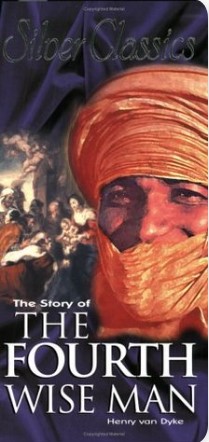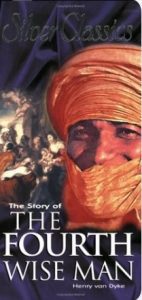A Book Report by Beth Woodmansee for the Friends of the Richland Library
First printed in 1895, Henry Van Dyke’s, The Story of the Fourth Wise Man, evokes the mystique of the ancient Middle East. Van Dyke relates in the preface that he doesn’t know from where the tale comes; only that it arrived intact and he simply wrote it as it played out in his mind. That old Christmas hymn, “We Three Kings of Orient Are,” lists the names of three wisemen, aka the Magi; Balthasar, Mechior and Caspar; they are not in the Bible. This book relates the tale of another Wise Man, a Zoroastrian priest, named, “Artaban,” forty-years-old, who planned to join those others to follow a new star to Jerusalem, where it was believed a new king was to be born. Artaban sold all he owned and purchased three gifts for the new king, a sapphire, a ruby, and a, “Pearl of great price.”
A hard ten days’ ride from Persia by horse brought Artaban to the place where they were to meet and set out together. Nearing that first destination, he noticed a figure, a man beaten near death, lying alongside the dark road. In his soul, he debated the wisdom of helping the man when to do so would surely delay him; but there was nothing else he could do. Working for hours, he succeeded in restoring life and took him to a nearby inn. Artaban rode again only to find a pile of stones with a message telling him they waited; then, decided to proceed to Jerusalem, another long journey across the desert requiring many provisions and camels.
He used his first jewel to pay for those provisions and continued on his way, grieving that he has one less gift for the king. Arriving in the empty village of Bethlehem, he heard a mother singing softly to her baby. He entered a dark house and the mother tells him there were rumors of Roman soldiers coming to kill all the boy babies. Outside they heard men’s shouts and women wailing in sudden grief. Artaban stood at the doorway and spoke to a soldier, telling him no one was inside. He gave his blood-red ruby to the soldier who directed his men elsewhere. Artaban grieved his unworthiness of seeing the new king since he has told a lie—the mother called it a, “wonderful lie.”
Artaban followed rumors of the little family in Egypt and elsewhere—always late. Thirty-three years passed; he was an old man still seeking the King. He returned to Jerusalem where he heard about three men who were being executed: two robbers and a man loved by many who was being crucified for claiming to be King of the Jews. Artaban wonders if this man could be the baby king. Pulling his pearl from its hiding place, he thinks to himself that he could purchase the King’s freedom when a young girl ran crying to him. Her father had died with many debts and she is being sold to satisfy them; he was a follower of Zoroastrianism and she recognized Artaban’s head covering. She begged him to save her from slavery or worse. The old priest gave her his last gift, the pearl. Suddenly the skies darkened and the ground began shaking. A roof tile fell on him and as he lay dying, he and the girl heard a soft voice speaking. The air was filled with lovely music. Artaban asked, “When was it, Lord, that I fed you, clothed you and cared for you?” The voice replied, “When you did these things for the least of these.”


